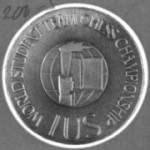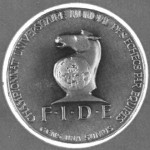|
The world student chess championships have already a long tradition and have gained great popularity in the framework of official competitions of world chess championships sponsored by FIDE.
The important part played by the Scandinavian countries in organising these World Student Chess Championships deserves mention. The first official World Student Championships in 1954 was held in Oslo, the capital of Norway. In 1956, the site of the World Championships was the old university city of Upssala in Sweden and in 1957, student chess players were the guests of the capital of Iceland, Reykjavik.
 In 1961, the eighth in the series of student chess championships was held in Helsinki, the capital of Finland. Chess players well remember the efficiently organised Chess Olympiad in Helsinki in 1952 and many who took part in this Olympiad came to Helsinki this year too, not as players, however, but mainly as leaders of their teams. From GDR came the champion Platz, the international champion, Flórián, was captain of the Hungarian team, Pithart came as captain of the Czech team together with the author of this article, and others. In 1961, the eighth in the series of student chess championships was held in Helsinki, the capital of Finland. Chess players well remember the efficiently organised Chess Olympiad in Helsinki in 1952 and many who took part in this Olympiad came to Helsinki this year too, not as players, however, but mainly as leaders of their teams. From GDR came the champion Platz, the international champion, Flórián, was captain of the Hungarian team, Pithart came as captain of the Czech team together with the author of this article, and others.
The 1961 championships were organised by the Finnish Chess Federation (Suomen Keskusshakkiliitto-Finlands Centralschackförbund), the Academic Finnish Chess Federation (Akateeminen Shakkiliitto), and the International Union of Students and sponsored by the International Chess Federation (FIDE) from 17 to 31 July, 1961.
Helsinki, on the Gulf of Finland, played host to students from 13 countries who came to Finland from four continents to compete with sporting ardour for the proud title of World Champion in matches between student teams of the International Chess Federation.
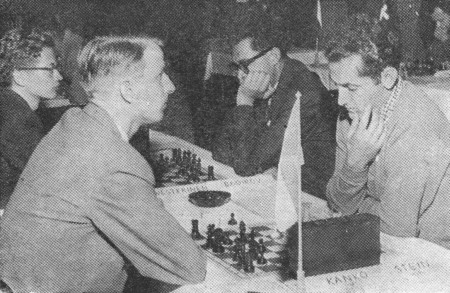 The draw was carried out on July 17 in "Poll", the student social centre of Helsinki, where further battles on the chess board were also waged. For the first time, the Students World Championship was attended by representatives from Denmark and Tunisia. The games were tough, but quite correct and played in a most friendly atmosphere. As the tournament table shows, the Soviet team gained a great victory, and so, after a two-year pause, won the title, as Champion of the World. It is interesting to note that there was not a single member from last year in this year's Soviet team. Moreover, the Soviet representatives played practically without reserves. The only reserve, Kuindzhi, came to Helsinki later and took part in only three games. Every member of the team played well, however, and their victory was quite merited. As a team, they were not once defeated, and only in one game, in the last round with the Czech team, was there even a draw. The defenders of the World Championship title, the USA team, arrived in Helsinki with almost the same members as they had last year in Leningrad. It seemed that they were strengthened by the International Master, Sherwin, who took part in the tournament at Portorož in 1958. It turned out, however, that Sherwin was the weakest player in the whole team. The Grandmaster, Lombardy, and the International Master, Weinstein, played well. The other members of the team did well too. Even so, they were not up to the excellent playing standard of the Soviet students. The draw was carried out on July 17 in "Poll", the student social centre of Helsinki, where further battles on the chess board were also waged. For the first time, the Students World Championship was attended by representatives from Denmark and Tunisia. The games were tough, but quite correct and played in a most friendly atmosphere. As the tournament table shows, the Soviet team gained a great victory, and so, after a two-year pause, won the title, as Champion of the World. It is interesting to note that there was not a single member from last year in this year's Soviet team. Moreover, the Soviet representatives played practically without reserves. The only reserve, Kuindzhi, came to Helsinki later and took part in only three games. Every member of the team played well, however, and their victory was quite merited. As a team, they were not once defeated, and only in one game, in the last round with the Czech team, was there even a draw. The defenders of the World Championship title, the USA team, arrived in Helsinki with almost the same members as they had last year in Leningrad. It seemed that they were strengthened by the International Master, Sherwin, who took part in the tournament at Portorož in 1958. It turned out, however, that Sherwin was the weakest player in the whole team. The Grandmaster, Lombardy, and the International Master, Weinstein, played well. The other members of the team did well too. Even so, they were not up to the excellent playing standard of the Soviet students.
A big battle was fought for third place between the Czech and GDR teams. The Czech students began the championship with great gusto and right from the start, kept in the lead. In the second half of the tournament, however, they faltered and in two games against Bulgaria and GDR, suffered unhappy defeats. Nevertheless, the fight against GDR turned out to be decisive and its results, giving the same number of points and games won, decided the final order of the Championship table. In the Czech team, Hort played weakly, and more was also expected from Augustin. In the GDR team, national champion Zinn, Baumbach and Weber played well.
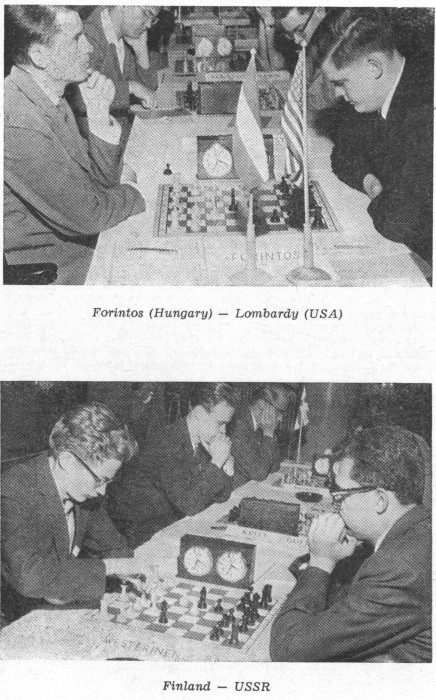 The team of the Bulgarian People's Republic from whom much was expected, as former World Champions in 1959, remained in the fifth position. Indeed, only the chief player, Radulov, playing on the first board, did well, even becoming the individual victor on this board. The play of Spiridonov was also good, but the others were disappointing. The Hungarian People's Republic finished only half a point behind the Bulgarian People's Republic. Apart from the reserve, Liptay, all members of the team played only average games, insufficient for better placing. The team of the Bulgarian People's Republic from whom much was expected, as former World Champions in 1959, remained in the fifth position. Indeed, only the chief player, Radulov, playing on the first board, did well, even becoming the individual victor on this board. The play of Spiridonov was also good, but the others were disappointing. The Hungarian People's Republic finished only half a point behind the Bulgarian People's Republic. Apart from the reserve, Liptay, all members of the team played only average games, insufficient for better placing.
England and the Mongolian People's Republic shared the 8th and 9th places. Their placing corresponds to the play of their representatives. The excellent play of Mabbs (England) who was praised as one of the best reserves deserves mention, however, as does Tsagan (Mongolia) who, on the second board, placed 4th in individual evaluation. The teams of Denmark, Finland and Sweden occupied positions corresponding to the play of their representatives. The Tunisian team which placed last, were playing for the first time in such a strong international competition and their players gained valuable experience which will certainly help them in future competitions.
The organisation of the whole Championships was very good, being in the hands of experienced experts. The chief director of the Tournament was Helge Hindström, Chairman of the Finnish Chess League and Vice-Chairman of FIDE. His deputy was the International Umpire, Eino Heilimo, and National Umpire Gerhard Lindström; the technical director as Bertil Johansson, Chairman of the Finnish Academic Chess League. It is worth mentioning that this year is the 50th anniversary of the first Academic Chess Club in Finland and the 25th anniversary of the first Academic Chess League.
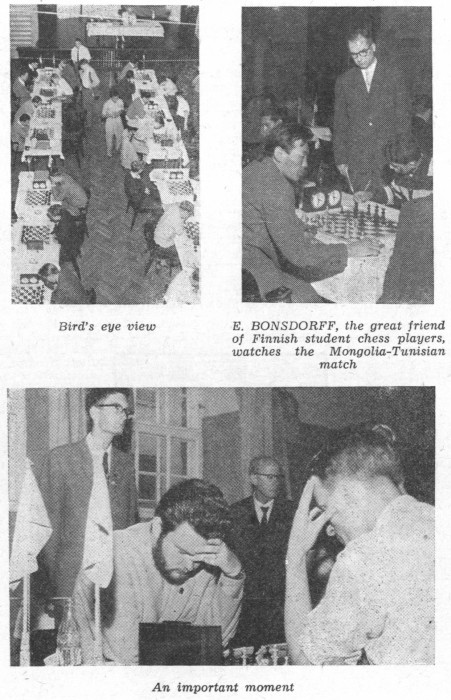 The participants of the championship were accommodated in the Olympic village of Otaniemi, ten miles from Helsinki. Transport between the village and the Tournament Hall was very quick and comfortable by the regular bus service, however. The Championships were played off without any serious dispute, thanks to the Chief Umpire, Osmo Kaily, (an international Master and Umpire), who, together with his deputies, the International Umpire Paavo Lithonen and International Umpire Kaarle Ojanen, ensured the smooth running of the whole championship by their tactful manner. Chess bulletins on the course of individual rounds of the VIIIth World Student Chess Championship were issued very promptly. The participants of the championship were accommodated in the Olympic village of Otaniemi, ten miles from Helsinki. Transport between the village and the Tournament Hall was very quick and comfortable by the regular bus service, however. The Championships were played off without any serious dispute, thanks to the Chief Umpire, Osmo Kaily, (an international Master and Umpire), who, together with his deputies, the International Umpire Paavo Lithonen and International Umpire Kaarle Ojanen, ensured the smooth running of the whole championship by their tactful manner. Chess bulletins on the course of individual rounds of the VIIIth World Student Chess Championship were issued very promptly.
On July 22nd, a dinner was arranged for the participants of the Tournament, where they were given the opportunity of sampling both a real Finnish sauna and also roast salami! The whole course of the Championship was followed with great interest by Finnish chess enthusiasts and the chairman and secretary of FIDE, Mr. Folke Rogard and Mr. Hugo Björk, visited the tournament. Mr. Rogard also attended a cocktail party which was given by the Finnish Academic League in honour of the organisers and team captains on July 30th.
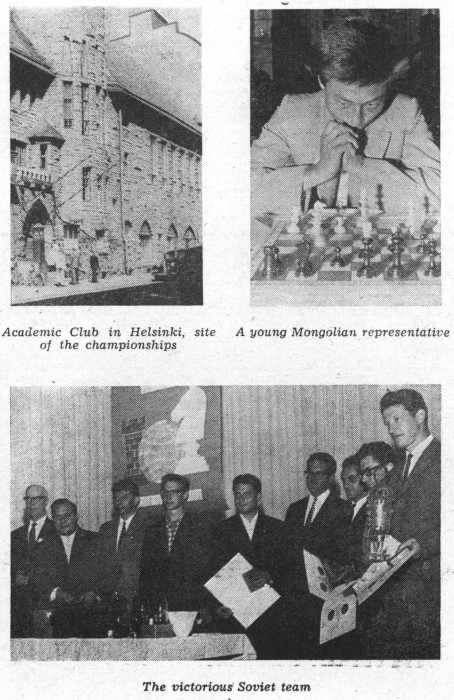 At the concluding ceremony on July 31st, which took place in the big "Poll" hall, the players were received by Mr. Helge Hindström, chairman of the Finnish Chess League and Vice-Chairman of FIDE. Competition results were then announced by the chief umpire, Osmo Kaila. In the name of FIDE and IUS, Jaroslav Šajtar heartily thanked all organisers and participants for the exemplary arrangement of the whole tournament and then, together with the Vice-Chairman of FIDE, Helge Hindström, proceeded to distribute the prizes. These were donated by the IUS. The first three teams received gold, silver and bronze-medals as well as crystal cups. All participants were given attendance medals and diplomas by the courtesy of the IUS as well as souvenirs from their Finnish hosts. Medals were also given to the best individual players at each board. These were as follows: At the concluding ceremony on July 31st, which took place in the big "Poll" hall, the players were received by Mr. Helge Hindström, chairman of the Finnish Chess League and Vice-Chairman of FIDE. Competition results were then announced by the chief umpire, Osmo Kaila. In the name of FIDE and IUS, Jaroslav Šajtar heartily thanked all organisers and participants for the exemplary arrangement of the whole tournament and then, together with the Vice-Chairman of FIDE, Helge Hindström, proceeded to distribute the prizes. These were donated by the IUS. The first three teams received gold, silver and bronze-medals as well as crystal cups. All participants were given attendance medals and diplomas by the courtesy of the IUS as well as souvenirs from their Finnish hosts. Medals were also given to the best individual players at each board. These were as follows:
At the first board — the Bulgarian representative, Radulov. At the second board — the honours were shared by Bagirov (USSR) and Weinstein (USA). The ensuing draw for the medal was won by Bagirov. At the third board - Gufeld (USSR). At the fourth board - Khodos (USSR). Among the first reserves, the best was Mabbs of England and among the second reserves, Weber of GDR. The International Master Böök judged and proclaimed the best games of the Championship; the prize for the best game was won by Stein of the USSR for his play against Zinn. The Weinstein—Davis game was considered the second best of the tournament and the third and fourth were those of Zinn—Soderbörg and Gufeld—Tumurbator. Just as in other years, there was close co-operation between the IUS and the Finnish organisers this year also.
 The VIIIth World Student Chess Championship ended to the complete satisfaction of all the participating nationalities. A series of interesting games were played and many student chess players were given the opportunity of gaining their first valuable experience of international tournaments. The Championships helped to further friendly relationships between student chess players of four continents. All who took part will long remember the white nights of Helsinki, the hospitality, and the friendly Finnish people. The VIIIth World Student Chess Championship ended to the complete satisfaction of all the participating nationalities. A series of interesting games were played and many student chess players were given the opportunity of gaining their first valuable experience of international tournaments. The Championships helped to further friendly relationships between student chess players of four continents. All who took part will long remember the white nights of Helsinki, the hospitality, and the friendly Finnish people.
All dispersed to their homelands with wishes of au revoir at the IXth World Student Chess Championship in London in 1962.
/ Ing. Jaroslav Šajtar, International Master and Vice-President of FIDE /
|
